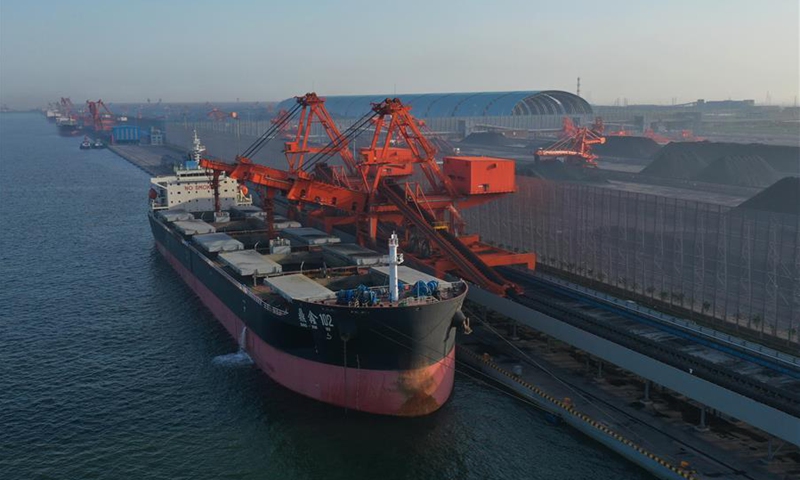SOURCE / MARKETS
Brazil’s epidemic likely to affect China’s iron ore supplies

Aerial photo taken on May 22, 2020 shows a bulk carrier loading cargoes at a newly built coal berth of Caofeidian Port in Tangshan, north China's Hebei Province. Caofeidian Port's coal berth is a coal discharging project in north China and its construction will be carried out in phases. The first part of the project's Phase Three has been put into use with an expected annual throughput of 50 million tonnes. (Xinhua/Yang Shiyao)
China's iron ore supply is expected to remain under considerable pressure in the near future as the rapid increase in new coronavirus cases in Brazil will likely impact local production, experts noted on Saturday.
Brazil on Friday became the second country in the world to report more than 1 million COVID-19 cases, with the death toll reaching nearly 49,000.
With the pandemic situation becoming so severe, future exports of Brazilian iron ore to China could face growing uncertainty if mining of the ore is disrupted, Zhou Dequan, director of the Shipping Development Institute of the Shanghai International Shipping Institute, told the Global Times on Saturday.
"Originally, the market had expected an increase in Brazilian iron ore supplies to China, as reflected in the recent soar of the Baltic sea freight index," Zhou noted, adding ore supplies depend on whether producers can maintain production amid the outbreak.
The Baltic Dry Index (BDI), a gauge tracking rates for vessels transporting dry commodities around the world, recorded its biggest weekly gain ever, surging 68.5 percent over the past week to a more than six-month high of 1,555 on Friday.
The robust demand for iron ore from Chinese steel mills and increased exports out of Brazil contributed to the rally, especially since Brazilian iron ore giant Vale SA is expected to restart work at the Itabira complex, according to Zhou.
Vale announced in a Wednesday document that it had been allowed to reopen mines in the Itabira complex since Minas Gerais state labor inspectors said the anti-virus measures the company had taken to protect its workers were sufficient to restart work.
"If the coronavirus outbreak affects Brazil's iron ore supplies to China, then Chinese steel mills will see their production costs rise quickly," Xu Gang, an independent steel analyst, told the Global Times on Saturday. "Considering the tensions between China and Australia, steel mills may avoid increasing imports from Australia," he said.
Amid China's recent drive to boost its economy through infrastructure construction, concerns over a shortage of iron ore has already fueled a round of price increases in recent days. On June 12, the most actively traded iron ore contract on the Dalian Commodity Exchange soared to a record 797.5 yuan ($112.76) per ton.
"So far we are still seeing an increase in iron ore out of Brazil to China, but the epidemic will be a growing source of uncertainty," Xu noted.
In the first five months of this year, China's iron ore imports from Brazil reached 75.67 million tons, up 7 percent year-on-year, according to data from Brazil's Ministry of Development, Industry and Foreign Trade.

